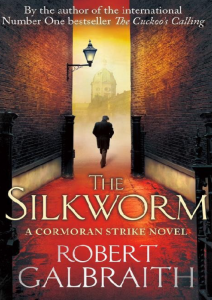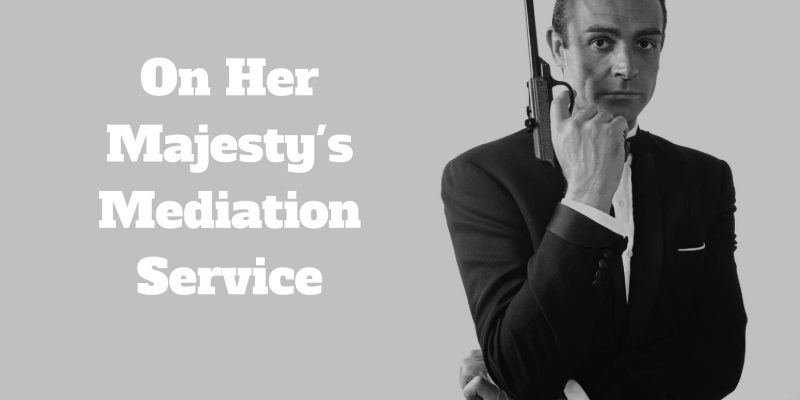James Bond enters a casino where a beautiful girl is sitting at the bar. He approaches her, buys her a drink and makes his obligatory introduction: “Bond, James Bond…” After brief chatting, she asks him about his profession. Then, the usually reckless hero comes up with a cover story:
“I am a mediator… Traveling to resolve a multinational business case.”
On Her Majesty Mediation Service
Sadly, the official cover story for the agent on Her Majesty secret service is an employee of a fictional import-export company named Universal Exports. Usually, he is ready to provide the enemies with fake business cards. In the case the curious villain calls a stated phone number, a specific person at the MI5 headquarters in London is ready to answer the phone and introduce him/herself as Universal Exports operator. Such a waste of potential. Imagine the cover story to be Universal Mediation Consultancy!
Someone may argue that Ian Fleming’s hero is everything else but a mediator: For more than sixty-six years, James Bond has been rather destroying relationships instead of creating new ones and improving old ones. Anyway, he is pretty distant from the sales representative too. Picking up a mediation as a cover story would not change the plot of Bond movies (and books) at all and it would help the ADR significantly, would it?
Have you ever wondered how much is ADR and mediation mentioned in movies and fictional books? Not surprisingly, the frequency is rather low. I guess one of the reasons for quite a scarce mentioning might be that people are naturally more attracted by the negative and tragic news. Thus the pop culture prefers war- to peacemaking-stories. However, the right question to be asked is as follows: “Is the mediation sporadic appearance in novels and movies a bad or good outcome? On the one hand, advertisement related to such a use would definitely help to promote ADR among the broad public. On the other, some examples of writers’ and screenwriters’ creativity are quite shocking and definitely not helping a lot. See for yourselves.
Warning the following text contains some spoilers.
Mediation Crashers
 Probably the most famous example of mediation being used as the full-time profession of the leading movie characters is the crazy-love comedy Wedding Crashers starring Owen Wilson and Vince Vaughn. John Beckwith and Jeremy Grey are friends, divorce lawyers, and irredeemable womanisers. They do have a weird hobby: Sneaking into other people’s weddings to enjoy food, party time and take advantage of the romantic atmosphere. The things go wrong as one of them falls in love with one of the bride’s sister. Definitely, Wedding Crashers is not a part of the world cinematographic heritage, however, as a crazy comedy for summer, it might be quite a relaxing watching. Especially because of the opening section showing (a very specific way of) mediation.
Probably the most famous example of mediation being used as the full-time profession of the leading movie characters is the crazy-love comedy Wedding Crashers starring Owen Wilson and Vince Vaughn. John Beckwith and Jeremy Grey are friends, divorce lawyers, and irredeemable womanisers. They do have a weird hobby: Sneaking into other people’s weddings to enjoy food, party time and take advantage of the romantic atmosphere. The things go wrong as one of them falls in love with one of the bride’s sister. Definitely, Wedding Crashers is not a part of the world cinematographic heritage, however, as a crazy comedy for summer, it might be quite a relaxing watching. Especially because of the opening section showing (a very specific way of) mediation.
From the same producers, there is another movie: Change Up. I have to admit I have never watched this movie since the trailer discouraged me from doing it. Anyway, I watched the mediation scene on youtube.com. It is rather brief and the main character acts as one of the party representatives. You may even see a brief opening statement done by the mediator and a kind of separate session. This proves that the screenwriter knew something about the matter.
Intoxicated Labour Mediator
From more serious ranks, I should mention the 2018 Netflix drama Beirut. Jon Hamm (best known for starring as advertising executive Don Draper in the series Mad Men) plays a former US diplomat Mason Skiles. After his wife is killed during an armed assault in Beirut, he returns back to the US where he acts as a kind of mediator of collective labour disputes (the word mediation is not used in the film). Although the story shows the mediator drinking alcoholic beverage before the meeting it seems he has some success anyway as the parties promised to resume the negotiation after a necessary break (not caused by intoxication of the main character, but rather by the need of some cool-off period). Mason is, however, taken back to Lebanon affected by the civil war in order to save his old friend so we do not know the outcome of the labour negotiation we were able to witness at the beginning of the plot. Surprisingly, Mason’s cover story for returning to Beirut is that he is going to give a lecture on Cross-culture arbitration at the local university. I have never heard of someone giving this kind of speech and I would be certainly interested in listening to it. Did not the screenwriters rather think of cross-culter negotiation/mediation? This would sound much more conventional.
There is a lot of (very specific) negotiation in popular lawyers series Suits which narrates a story of Mike Ross, a brilliant college dropout, and Harvey Specter, the most prominent NYC lawyer. But I believe formal mediation has never been used in the plot. In another comedy-drama show inspired by the legal environment, Fairly Legal, a mediator is the main character. Kate Reed, a young lawyer, leaves her practice as a litigator to become an ADR specialist. The ranking of Fairly Legal is rather low and after watching the pilot, I had to admit the critics were right. Anyway, it offers a couple of funny phrases to remember: “I am a mediator…I do not have emergencies…” and a definition of mediation I would not be happy to hear from my students during the examination: “A mediator is kind of a referee in a game with no rules – except those agreed to by the parties involved…” Obviously, we cannot expect the pop-culture pieces giving precise definitions and picture of our professions. On the other hand – mediating a dispute between a robber and bartender? I did not know that this is a part of our profession at the time I enrolled…
Murdering Mediator
Apart from movies, mediation was mentioned also in fictional novels. I am sure there might be others, but the following two have caught my attention.
First of them is a book Her Every Fear by brilliant writer Peter Swanson. It narrates a story of a bit neurotic English girl Kate Priddy who temporarily swapped her London apartment with her cousin in Boston. As she had arrived in New England, she discovered that next door neighbour was assassinated. I am not willing to reveal the main twists of the story in the following lines, however, should you consider reading this book, please, skip to the next paragraph. And for the more impatient readers: At a certain point of the storyline, one of the characters discovered that the murderer had been changing names and picking the new ones from Stanley Kubrick’s movies. Recently, he was using Jack Torrance – a name of a character played by Jack Nicholson in the horror Shining. As the seeker googled the current whereabouts of this person, he discovered the murderer’s profession: A mediation consultant with a Columbia University Masters degree in Conflict Resolution. Oh, no! Anyway, despite this disappointment for all ADR professionals, the book is worth reading, though the same author’s The Kind Worth Killing is even better (no mentioning of mediation, fortunately).
Staying in the crime story shelf, I have to admit I very much enjoyed reading of all three Cormoran Strike novels written by Robert Galbraith. In fact, a bit mysteriously, this is a pseudonym of J. K. Rowling, author of the bestselling Harry Potter stories. It is definitely pleasuring to meet young private investigator Cormoran Strike who is a war veteran. He gained his investigative experiences in the army police, however, was discharged when he lost his leg in Afghanistan. All the three stories soon got credit both by readers and critics, thus it is even more disappointing that one of them is showing mediation in the bad light.
J. K. Rowling Criticising ADR
 In the second novel, The Silkworm, the detective is watching his small portable TV set and listening to Kenneth Clarke, the Justice Secretary, announcing plans to invest £350 million from the legal aid budget in order to ‘discourage people from resorting to lawyers whenever they face a problem, and instead encourage them to consider more suitable methods of dispute resolution’. Instead of appreciating this ADR effort, he is criticising severely this plan in the following way:
In the second novel, The Silkworm, the detective is watching his small portable TV set and listening to Kenneth Clarke, the Justice Secretary, announcing plans to invest £350 million from the legal aid budget in order to ‘discourage people from resorting to lawyers whenever they face a problem, and instead encourage them to consider more suitable methods of dispute resolution’. Instead of appreciating this ADR effort, he is criticising severely this plan in the following way:
“He meant, of course, that poor people ought to relinquish the services of the law. The likes of Strike’s average client would still avail themselves of expensive barristers. Most of his work these days was undertaken on behalf of the mistrustful, endlessly betrayed rich. His was the information that fed their sleek lawyers, that enabled them to win better settlements in their vitriolic divorces and their acrimonious business disputes. A steady stream of wellheeled clients was passing his name on to similar men and women, with tediously similar difficulties; this was the reward for distinction in his particular line of work, and if it was often repetitive, it was also lucrative.”
I am not sure whether the author just wanted to illustrate the pessimism and grumps mood of the former war hero, however, especially given the huge influence J. K. Rowling is enjoying, I guess it would be much better if the fictional detective appreciates such an effort. This is even more startling as J. K. Rowling is known for her philanthropical nature. Especially given the fact that mediation and other ADR are really helping to protect financial resources of ordinary people all around the globe.
I am afraid it is too late to hope there will be some remedy in the coming Lethal White which is scheduled to be published in September 2018. Anyway, should she choose to set it right, she might consider returning to the Harry Potter world and retrospectively declare that all the Hogwarts School of Witchcraft and Wizardry Scholarships Contracts included a mediation clause.
One Mediation to Rule them All
 Speaking about fantasy word, there is one interesting reference of a contract in the Hobbit novel that is concluded between the main character, Bilbo Baggins, and the company of Dwarfs before launching their trip to Lonely Mountain. The book is quite brief when it comes to the terms of the contract, but the movie brought us more details. Though the long contract plays rather a brief role (Bilbo is signing it as he joined the company after some hesitation), the movie-artists created a real contract, an artifact that starred in the movie. Instead of writing whatever crossed their mind as the Elvish letters Cirth were used and only a few spectators are able to read them, they drafted a realistic contract (if interested you may even purchase its copy or at least read its complete legal analysis according to the common law).
Speaking about fantasy word, there is one interesting reference of a contract in the Hobbit novel that is concluded between the main character, Bilbo Baggins, and the company of Dwarfs before launching their trip to Lonely Mountain. The book is quite brief when it comes to the terms of the contract, but the movie brought us more details. Though the long contract plays rather a brief role (Bilbo is signing it as he joined the company after some hesitation), the movie-artists created a real contract, an artifact that starred in the movie. Instead of writing whatever crossed their mind as the Elvish letters Cirth were used and only a few spectators are able to read them, they drafted a realistic contract (if interested you may even purchase its copy or at least read its complete legal analysis according to the common law).
The contract concludes for a Mandatory Binding Arbitration in the Dwarvish Tongue: “Disputes arising between the Contract Parties shall be heard and judged by an arbitrator of the Company’s choosing.” See, the courageous dwarfs did not choose to mediate. This is hardly surprising given their temper that is shown throughout all the book and movie. I guess it would be a different story should the contract be drafted by the sage wizard Gandalf or the wise Elvish queen Galadriel.
Please do not hesitate to comment should you have crossed another mediation example in the books you have read and movies you have watched.
________________________
To make sure you do not miss out on regular updates from the Kluwer Mediation Blog, please subscribe here.




Martin, the first showing of a “mediation” I saw in pop movie culture was in the film “Disclosure” about reverse sexual harassment (Michael Douglas, Demi Moore (1994). A clip of the opening scene of the supposed mediation can be found at: https://www.youtube.com/watch?v=0wtThDkhOO0
They called it mediation but it degenerated into a very nasty little mini-trial instead. A good example of how NOT to mediate !
Dear Paul, Thank you very much for your comment and tip. I have never watched that movie and but already the opening is awkward… M
Martin, the most off-color and funniest use of ADR that I’ve seen is from the TV series “It’s Always Sunny in Philadelphia,” and specifically the episode “hero or hate crime?” If you don’t know the show, you must understand that the characters are all awful people who are always trying to do ill unto each other or anyone else they come into contact with.
In this particular episode, one of the characters, Mac, is saved when Frank (played by Danny DeVito) yells a slur, causing him to jump out of the way of a falling piano. With some leaps of logic, this incident gives rise to a dispute over which of the gang is the legal owner of an unscratched lottery ticket that was purchased in the same moment. Since they can’t agree, they hire an arbitrator, each presenting an appalling or morally corrupt reason to support their position.
Although it’s labeled arbitration, it is ultimately a great example of mediation because, in the end, the process leads to collaboration with a solution that satisfies all of these unpleasant people.
Michael, Thank you for yet another example. I did not know this one and definitely have to catch up. It sounds very interesting! M
It means the world to us to hear such positive feedback on our blog posts. We strive to create valuable content for our readers and it’s always encouraging to hear that it’s making an impact.
Your content always keeps me coming back for more!
Your positive and uplifting words are like a ray of sunshine on a cloudy day Thank you for spreading light and positivity in the world
I admire how this blog promotes kindness and compassion towards ourselves and others We could all use a little more of that in our lives
This post is jam-packed with valuable information and I appreciate how well-organized and easy to follow it is Great job!
The positivity and optimism conveyed in this blog never fails to uplift my spirits Thank you for spreading joy and positivity in the world
Your blog has become my go-to source for inspiration and motivation I am so grateful for the valuable content you provide
Your blog is a ray of sunshine in a sometimes dark and dreary world Thank you for spreading positivity and light
Your blog is so much more than just a collection of posts It’s a community of like-minded individuals spreading optimism and kindness
From start to finish, your content is simply amazing. You have a talent for making complex topics easy to understand and I always come away with valuable insights.
This is exactly what I needed to read today Your words have given me a new perspective and renewed hope Thank you
It’s clear that you truly care about your readers and want to make a positive impact on their lives Thank you for all that you do
Your blog is a ray of sunshine in a sometimes dark and dreary world Thank you for spreading positivity and light
Your blog has helped me become a better version of myself Your words have inspired me to make positive changes in my life